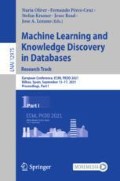Abstract
Federated Learning (FL) generates a single global model via collaborating distributed clients without leaking data privacy. However, the statistical heterogeneity of non-iid data across clients poses a fundamental challenge to the model personalization process of each client. Our significant observation is that the newly downloaded global model from the server may perform poorly on local clients, while it could become better after adequate personalization steps. Inspired by this, we advocate that the hard-won personalized model in each communication round should be rationally exploited, while standard FL methods directly overwrite the previous personalized models. Specifically, we propose a novel concept named “inHerited Private Model” (HPM) for each local client as a temporal ensembling of its historical personalized models and exploit it to supervise the personalization process in the next global round. We explore various types of knowledge transfer to facilitate the personalization process. We provide both theoretical analysis and abundant experimental studies to verify the superiorities of our algorithm.
Access this chapter
Tax calculation will be finalised at checkout
Purchases are for personal use only
References
Arivazhagan, M.G., Aggarwal, V., Singh, A.K., Choudhary, S.: Federated learning with personalization layers. CoRR abs/1912.00818 (2019)
Caldas, S., et al.: LEAF: A benchmark for federated settings. CoRR abs/1812.01097 (2018)
Gretton, A., Borgwardt, K.M., Rasch, M.J., Schölkopf, B., Smola, A.J.: A kernelmethod for the two-sample-problem. In: Advances in Neural Information ProcessingSystems 19, pp. 513–520 (2006)
Hamer, J., Mohri, M., Suresh, A.T.: FedBoost: a communication-efficient algorithm for federated learning. In: Proceedings of the 37th International Conference on Machine Learning, pp. 3973–3983 (2020)
Hinton, G.E., Vinyals, O., Dean, J.: Distilling the knowledge in a neural network. CoRR abs/1503.02531 (2015)
Kairouz, P., et al.: Advances and open problems in federated learning. CoRR abs/1912.04977 (2019)
Karimireddy, S.P., Kale, S., Mohri, M., Reddi, S.J., Stich, S.U., Suresh, A.T.: SCAFFOLD: stochastic controlled averaging for federated learning. In: Proceedings of the 37th International Conference on Machine Learning, pp. 5132–5143 (2020)
Krizhevsky, A.: Learning multiple layers of features from tiny images (2012)
Kulkarni, V., Kulkarni, M., Pant, A.: Survey of personalization techniques for federated learning. CoRR abs/2003.08673 (2020)
Laine, S., Aila, T.: Temporal ensembling for semi-supervised learning. In: 5th International Conference on Learning Representations (2017)
Li, D., Wang, J.: FedMD: Heterogenous federated learning via model distillation. CoRR abs/1910.03581 (2019)
Li, T., Sahu, A.K., Zaheer, M., Sanjabi, M., Talwalkar, A., Smith, V.: Federated optimization in heterogeneous networks. In: Proceedings of Machine Learning and Systems (2020)
Li, X., Grandvalet, Y., Davoine, F.: Explicit inductive bias for transfer learning with convolutional networks. In: Proceedings of the 35th International Conference on Machine Learning, vol. 80, pp. 2830–2839 (2018)
Liang, P.P., Liu, T., Liu, Z., Salakhutdinov, R., Morency, L.: Think locally, act globally: Federated learning with local and global representations. CoRR abs/2001.01523 (2020)
Long, M., Cao, Y., Wang, J., Jordan, M.I.: Learning transferable features with deep adaptation networks. In: Proceedings of the 32nd International Conference on Machine Learning, vol. 37, pp. 97–105 (2015)
Mansour, Y., Mohri, M., Ro, J., Suresh, A.T.: Three approaches for personalization with applications to federated learning. CoRR abs/2002.10619 (2020)
McMahan, B., Moore, E., Ramage, D., Hampson, S., y Arcas, B.A.: Communication-efficient learning of deep networks from decentralized data. In: Proceedings of the 20th International Conference on Artificial Intelligence and Statistics, pp. 1273–1282 (2017)
Pan, S.J., Yang, Q.: A survey on transfer learning. IEEE Trans. Knowl. Data Eng. 22(10), 1345–1359 (2010)
Peterson, D., Kanani, P., Marathe, V.J.: Private federated learning with domain adaptation. CoRR abs/1912.06733 (2019)
Shen, T., et al.: Federated mutual learning. CoRR abs/2006.16765 (2020)
Shoham, N., et al.: Overcoming forgetting in federated learning on non-iid data. CoRR abs/1910.07796 (2019)
Tarvainen, A., Valpola, H.: Mean teachers are better role models: weight-averaged consistency targets improve semi-supervised deep learning results. In: 5th International Conference on Learning Representations (2017)
Yang, Q., Liu, Y., Chen, T., Tong, Y.: Federated machine learning: concept and applications. ACM TIST 10(2), 12:1–12:19 (2019)
Yao, X., Huang, C., Sun, L.: Two-stream federated learning: reduce the communication costs. In: IEEE Visual Communications and Image Processing, pp. 1–4 (2018)
Yao, X., Huang, T., Wu, C., Zhang, R., Sun, L.: Towards faster and better federated learning: a feature fusion approach. In: IEEE International Conference on Image Processing, pp. 175–179 (2019)
Yu, T., Bagdasaryan, E., Shmatikov, V.: Salvaging federated learning by local adaptation. CoRR abs/2002.04758 (2020)
Zhao, Y., Li, M., Lai, L., Suda, N., Civin, D., Chandra, V.: Federated learning with non-iid data. CoRR abs/1806.00582 (2018)
Acknowledgments
This research was partially supported by National Natural Science Foundation of China (Grant Nos. 61773198, 61632004 and 61921006), and NSFC-NRF Joint Research Project under Grant 61861146001, and Collaborative Innovation Center of Novel Software Technology and Industrialization. Thanks to Huawei Noah’s Ark Lab NetMIND Research Team for funding this research. Professor De-Chuan Zhan is the corresponding author.
Author information
Authors and Affiliations
Corresponding author
Editor information
Editors and Affiliations
Rights and permissions
Copyright information
© 2021 Springer Nature Switzerland AG
About this paper
Cite this paper
Li, XC., Zhan, DC., Shao, Y., Li, B., Song, S. (2021). FedPHP: Federated Personalization with Inherited Private Models. In: Oliver, N., Pérez-Cruz, F., Kramer, S., Read, J., Lozano, J.A. (eds) Machine Learning and Knowledge Discovery in Databases. Research Track. ECML PKDD 2021. Lecture Notes in Computer Science(), vol 12975. Springer, Cham. https://doi.org/10.1007/978-3-030-86486-6_36
Download citation
DOI: https://doi.org/10.1007/978-3-030-86486-6_36
Published:
Publisher Name: Springer, Cham
Print ISBN: 978-3-030-86485-9
Online ISBN: 978-3-030-86486-6
eBook Packages: Computer ScienceComputer Science (R0)


